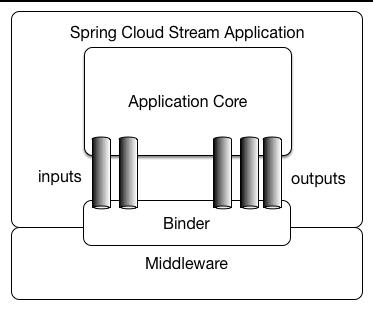SpringCloud学习之SpringCloudStream&集成kafka
Posted 专注Java后端技术
tags:
篇首语:本文由小常识网(cha138.com)小编为大家整理,主要介绍了SpringCloud学习之SpringCloudStream&集成kafka相关的知识,希望对你有一定的参考价值。
一、关于Spring-Cloud-Stream
Spring Cloud Stream本质上就是整合了Spring Boot和Spring Integration,实现了一套轻量级的消息驱动的微服务框架。通过使用Spring Cloud Stream,可以有效地简化开发人员对消息中间件的使用复杂度,让系统开发人员可以有更多的精力关注于核心业务逻辑的处理。
在这里我先放一张官网的图:

应用程序通过Spring Cloud Stream注入到输入和输出通道与外界进行通信。根据此规则我们很容易的实现消息传递,订阅消息与消息中转。并且当需要切换消息中间件时,几乎不需要修改代码,只需要变更配置就行了。
在用例图中 Inputs代表了应用程序监听消息 、outputs代表发送消息、binder的话大家可以理解为将应用程序与消息中间件隔离的抽象,类似于三层架构下利用dao屏蔽service与数据库的实现的原理。
springcloud默认提供了rabbitmq与kafka的实现。
二、springcloud集成kafka
1、添加gradle依赖:

dependencies{ compile(\'org.springframework.cloud:spring-cloud-stream\') compile(\'org.springframework.cloud:spring-cloud-stream-binder-kafka\') compile(\'org.springframework.kafka:spring-kafka\') }
2、定义一个接口:
spring-cloud-stream已经给我们定义了最基本的输入与输出接口,他们分别是 Source,Sink, Processor
Sink接口:

package org.springframework.cloud.stream.messaging; import org.springframework.cloud.stream.annotation.Input; import org.springframework.messaging.SubscribableChannel; public interface Sink { String INPUT = "input"; @Input("input") SubscribableChannel input(); }
Source接口:

package org.springframework.cloud.stream.messaging; import org.springframework.cloud.stream.annotation.Output; import org.springframework.messaging.MessageChannel; public interface Source { String OUTPUT = "output"; @Output("output") MessageChannel output(); }
Processor接口:

package org.springframework.cloud.stream.messaging; public interface Processor extends Source, Sink { }
这里面Processor这个接口既定义输入通道又定义了输出通道。同时我们也可以自己定义通道接口,代码如下:

package com.bdqn.lyrk.shop.channel; import org.springframework.cloud.stream.annotation.Input; import org.springframework.cloud.stream.annotation.Output; import org.springframework.messaging.MessageChannel; import org.springframework.messaging.SubscribableChannel; public interface ShopChannel { /** * 发消息的通道名称 */ String SHOP_OUTPUT = "shop_output"; /** * 消息的订阅通道名称 */ String SHOP_INPUT = "shop_input"; /** * 发消息的通道 * * @return */ @Output(SHOP_OUTPUT) MessageChannel sendShopMessage(); /** * 收消息的通道 * * @return */ @Input(SHOP_INPUT) SubscribableChannel recieveShopMessage(); }
3、定义服务类

package com.bdqn.lyrk.shop.server; import com.bdqn.lyrk.shop.channel.ShopChannel; import org.springframework.cloud.stream.annotation.StreamListener; import org.springframework.messaging.Message; import org.springframework.messaging.MessageChannel; import org.springframework.messaging.support.MessageBuilder; import org.springframework.web.bind.annotation.GetMapping; import org.springframework.web.bind.annotation.RestController; import javax.annotation.Resource; @RestController public class ShopService { @Resource(name = ShopChannel.SHOP_OUTPUT) private MessageChannel sendShopMessageChannel; @GetMapping("/sendMsg") public String sendShopMessage(String content) { boolean isSendSuccess = sendShopMessageChannel. send(MessageBuilder.withPayload(content).build()); return isSendSuccess ? "发送成功" : "发送失败"; } @StreamListener(ShopChannel.SHOP_INPUT) public void receive(Message<String> message) { System.out.println(message.getPayload()); } }
这里面大家注意 @StreamListener。这个注解可以监听输入通道里的消息内容,注解里面的属性指定我们刚才定义的输入通道名称,而MessageChannel则可以通过
输出通道发送消息。使用@Resource注入时需要指定我们刚才定义的输出通道名称
4、定义启动类

package com.bdqn.lyrk.shop; import com.bdqn.lyrk.shop.channel.ShopChannel; import org.springframework.boot.SpringApplication; import org.springframework.boot.autoconfigure.SpringBootApplication; import org.springframework.cloud.stream.annotation.EnableBinding; @SpringBootApplication @EnableBinding(ShopChannel.class) public class ShopServerApplication { public static void main(String[] args) { SpringApplication.run(ShopServerApplication.class, args); } }
注意@EnableBinding注解,这个注解指定刚才我们定义消息通道的接口名称,当然这里也可以传多个相关的接口
5、定义application.yml文件

spring: application: name: shop-server cloud: stream: bindings: #配置自己定义的通道与哪个中间件交互 shop_input: #ShopChannel里Input和Output的值 destination: zhibo #目标主题 shop_output: destination: zhibo default-binder: kafka #默认的binder是kafka kafka: bootstrap-servers: localhost:9092 #kafka服务地址 consumer: group-id: consumer1 producer: key-serializer: org.apache.kafka.common.serialization.ByteArraySerializer value-serializer: org.apache.kafka.common.serialization.ByteArraySerializer client-id: producer1 server: port: 8100
这里是重头戏,我们必须指定所有通道对应的消息主题,同时指定默认的binder为kafka,紧接着定义Spring-kafka的外部化配置,在这里指定producer的序列化类为ByteArraySerializer
启动程序成功后,我们访问 http://localhost:8100/sendMsg?content=2 即可得到如下结果
以上是关于SpringCloud学习之SpringCloudStream&集成kafka的主要内容,如果未能解决你的问题,请参考以下文章
